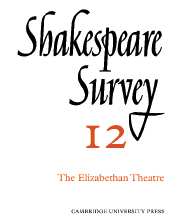Book contents
- Frontmatter
- The Open Stage: Elizabethan or Existentialist?
- The Lantern of Taste
- Was there a Typical Elizabethan Stage?
- On Reconstructing a Practicable Elizabethan Public Playhouse
- The Discovery-space in Shakespeare’s Globe
- ‘Passing over the Stage’
- The Actor at the Foot of Shakespeare’s Platform
- Elizabethan Stage-Practice and the Transmutation of Source Material by the Dramatists
- The Maddermarket Theatre and the Playing of Shakespeare
- Actors and Scholars: A View of Shakespeare in the Modern Theatre
- Cleopatra as Isis
- Shakespeare’s Friends: Hathaways and Burmans at Shottery
- Illustrations of Social Life II: A Butcher and some Social Pests
- International Notes
- Shakespeare Productions in the United Kingdom: 1957
- The Whirligig of Time, A Review of Recent Productions
- The Year's Contributions to Shakespearian Study 1 Critical Studies
- 2 Shakespeare’s Life, Times and Stage
- 3 Textual Studies
- Books Received
- Index
- Plate Section
The Maddermarket Theatre and the Playing of Shakespeare
Published online by Cambridge University Press: 28 March 2007
- Frontmatter
- The Open Stage: Elizabethan or Existentialist?
- The Lantern of Taste
- Was there a Typical Elizabethan Stage?
- On Reconstructing a Practicable Elizabethan Public Playhouse
- The Discovery-space in Shakespeare’s Globe
- ‘Passing over the Stage’
- The Actor at the Foot of Shakespeare’s Platform
- Elizabethan Stage-Practice and the Transmutation of Source Material by the Dramatists
- The Maddermarket Theatre and the Playing of Shakespeare
- Actors and Scholars: A View of Shakespeare in the Modern Theatre
- Cleopatra as Isis
- Shakespeare’s Friends: Hathaways and Burmans at Shottery
- Illustrations of Social Life II: A Butcher and some Social Pests
- International Notes
- Shakespeare Productions in the United Kingdom: 1957
- The Whirligig of Time, A Review of Recent Productions
- The Year's Contributions to Shakespearian Study 1 Critical Studies
- 2 Shakespeare’s Life, Times and Stage
- 3 Textual Studies
- Books Received
- Index
- Plate Section
Summary
The question which is constantly being put to me is: “Why choose an out-of-the-way place like Norwich for a theatrical experiment? ” My answer must be biographical.
Norwich, a city of 130,000 inhabitants, has always been cut off from the rest of England by rather bad communications. It is not on the Great North Road, and such roads as existed when our Maddermarket began led to Norwich and to nowhere else save the sea. This relative isolation created in the city a spirit of independence; the inhabitants made everything they needed, and by the fifteenth century were able to export woollen goods dyed with the root of the Madder, for which was created a special Madder Market. The prosperity of the city is reflected in the forty remaining perpendicular-style churches of this period, all within the city walls. The place is very much alive and many municipal experiments have been tried out here, such as lighting the streets by electricity and inaugurating the first free library to be put on the twopenny rate. There was a fairly large, educated audience ready to hand; the idea of giving Shakespeare's plays upon the kind of stage for which they were written seemed both acceptable and respectable, and we received a warm support in our venture.
- Type
- Chapter
- Information
- Shakespeare Survey , pp. 71 - 75Publisher: Cambridge University PressPrint publication year: 1959
- 1
- Cited by

